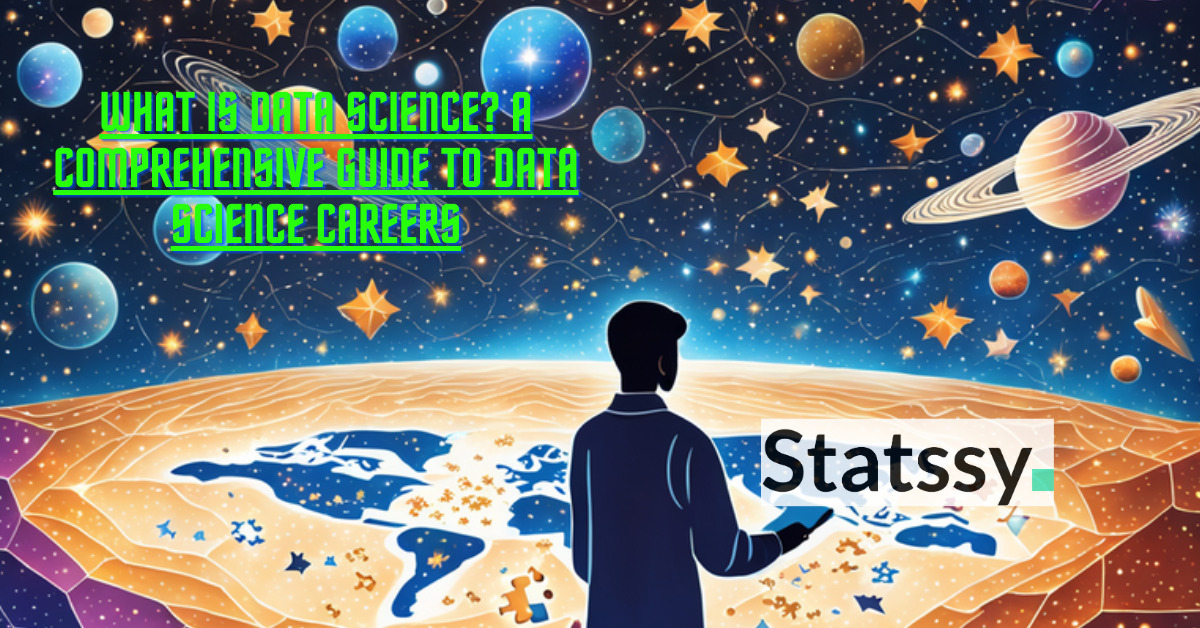Hey There! Welcome to Statssy! Today I will explain you what data science is and how you can explore a career in this domain.
Data science is a field that has been described as a mix of mathematics, statistics, computer science, and a pinch of art. It’s a rapidly growing industry that has seen significant interest over the last decade.
Table of Contents
As businesses in all sectors are becoming more data-driven, the need for talented data scientists who can understand, analyze, and predict complex patterns in large datasets has increased exponentially.
Defining Data Science
So, what is data science? At its core, data science is about extracting knowledge from data. It requires a combination of skills in three major areas—domain expertise, technology, and statistics.
- Domain expertise: Understanding the business problem, making sense of the data, and knowing how to apply the right methods to solve the problem.
- Technology: Proficiency in tools like R, Python, SQL, etc., which help in handling large datasets and performing complex computations.
- Statistics: Familiarity with statistical theories and data manipulation techniques to interpret and visualize data in a meaningful way. In fact, understanding the concepts of probability and statistics for data science is fundamental to the role.
Data science isn’t about using sophisticated algorithms and high-tech software to create flashy visualizations—it’s about using data to generate real value for businesses.
Understanding Data Science 2024 Jobs
There are many roles within the field of data science—data analysts, data engineers, machine learning engineers, and of course, data scientists. A data science job involves understanding complex business problems, designing data modelling processes, creating algorithms and predictive models to extract the business insights, and then translating this data into understandable terms for business stakeholders.
Despite the common misconception, data science is not just for tech companies. Industries from healthcare to finance to e-commerce—and everything in between—are using data science to drive business strategies.
In recent times, an increasing number of data science jobs are remote, allowing for flexible working environments. This shift has been accelerated by global circumstances, but also by the nature of the work—data scientists can effectively perform their jobs from anywhere, as long as they have a computer and a good internet connection.
“The future of data science is promising. With the increasing reliance on data-driven decision making, data science skills are set to remain in high demand for years to come.”
But are data science jobs in demand? Absolutely. LinkedIn’s 2020 Emerging Jobs Report identified data science as a high-growth field, with demand significantly outpacing the current supply of qualified professionals. The increasing volume and availability of data, coupled with advancements in technology and AI, means that data science’s importance will continue to rise in the future.
Data Science Education and Training
Given its multi-disciplinary nature, data science education typically requires a blend of skills across mathematics, computer science, statistics, and domain-specific knowledge. As such, many interested in this field often pursue a data science degree or a masters in data science.
There has been a significant surge in the number of data science bootcamps, promising to equip students with the necessary skills in a shorter time frame. These bootcamps can be an excellent way to break into the field if you’re willing to commit to an intensive learning program.
Data Science Careers 2024
And yet, if you’re wondering, “Are data science bootcamps worth it?” The answer is—it depends. It’s essential to consider your own learning style, the reputation and outcomes of the bootcamp, the skills taught, and the support offered in job placement before deciding. It’s not a
one-size-fits-all answer, and what works best for you will depend on your personal circumstances and career goals.
For those who prefer self-paced learning or have time constraints, there are numerous online courses available to learn data science. Platforms like Coursera and edX offer comprehensive courses that cover everything from the basics of Python programming to advanced machine learning algorithms. These courses often come with certificates upon completion, which can be added to your resume or LinkedIn profile.
The use of R in data science has also become increasingly popular. R for data science provides powerful tools for handling, cleaning, and analyzing data. It’s particularly popular in academia and research but is also making its way into more commercial settings.
Data science is more than a buzzword—it’s a revolution that’s transforming the way we live and do business. Whether it’s predicting future sales, optimizing marketing strategies, or advancing healthcare through predictive diagnostics—data science is making it possible.
Unveiling Data Science Salaries
When considering a career in data science, it’s natural to wonder about potential earnings. The data science salary scale can vary widely, depending on factors such as geographical location, level of education, years of experience, industry, and job role. However, on average, data scientists earn significantly more than the national average for all jobs.
According to Glassdoor, as of 2023, the average base pay for data scientists in the United States is $113,309 per year, with a low-end salary around $83,000 and high-end salaries exceeding $154,000. Salaries in large metropolitan areas, especially those with a high cost of living, can be substantially higher.
A masters in data science can also increase earning potential. A study by Burtch Works, a recruitment agency specializing in quantitative professionals, found that those with a graduate degree tend to earn more than those with just a bachelor’s degree.
“Investing in data science education can pay dividends in terms of future earning potential.”
Decoding the World of Data Science and Analytics
Understanding data science and analytics means appreciating the relationship between these two areas. While they both involve working with data, the focus and outcomes of each field can differ.
Data science is a broad umbrella that includes data cleaning, exploration, and analysis, as well as machine learning and predictive modeling. It aims to extract insights and knowledge from data.
On the other hand, analytics often refers more specifically to the application of statistical models and methods to data to answer specific business questions. It involves drawing conclusions from data and presenting the results in a way that is useful for decision-making.
Thus, the journey from raw data to actionable insights involves both data science and analytics.
Job Market: Are Data Science Jobs Declining?
A common question potential data scientists might have is, “Are data science jobs declining?” The answer is a resounding no. According to the U.S. Bureau of Labor Statistics, the demand for data scientists is projected to grow much faster than the average for all occupations through 2028.
Despite the increase in the number of people entering the field, there is still a significant shortage of skilled professionals who can handle the increasingly complex tasks associated with big data and advanced analytics.
“The rise of big data and the growing importance of analytics ensure that the demand for data science skills is here to stay.”
One possible reason for the misconception of a decline is the shift in job titles. As the field of data science matures, more specialized roles are emerging, such as data engineer or machine learning engineer, which were previously grouped under the umbrella of ‘data scientist’.
Moreover, the need for data science skills extends beyond tech companies. Sectors as diverse as healthcare, finance, and retail are all leveraging data science to improve their operations and strategies, fueling the demand for data scientists across a wide array of industries.
Next, we delve deeper into the world of data science education, examining the importance of data science courses and the increasing popularity of learning data science through Python. Stay tuned!
Understanding Data Science Education: Courses, Bootcamps, and More
The pathway to becoming a data scientist is not one-size-fits-all. There are several educational routes one could take, including earning a data science degree, taking a data science course, or attending a data science bootcamp.
Those who ask, “Are data science bootcamps worth it?” should consider their individual needs and circumstances. Bootcamps can be a quick, intensive way to learn practical skills and gain experience with projects. They’re often great for career-changers or those wanting to advance quickly. However, they usually don’t provide the breadth and depth of theoretical knowledge you would get from a degree program.
“Choosing the right educational path in data science depends on your personal goals, learning style, and time commitment.”
If you’re considering a data science major, know that it will provide a well-rounded foundation in both the theory and application of data science. You’ll likely cover a range of topics, including statistics, programming, data visualization, and machine learning. Some programs also offer concentrations in areas like business analytics or artificial intelligence.
Why Python for Data Science?
The prominence of data science through Python in the industry is undeniable. Python’s simple syntax and rich collection of libraries make it a favorite among data scientists. Libraries like NumPy for numerical operations, pandas for data manipulation, Matplotlib for data visualization, and Scikit-learn for machine learning make Python a versatile tool for a wide range of data science tasks.
However, learning R for data science is also beneficial, particularly for those interested in statistical analysis or in industries such as healthcare and academia where R is widely used.
Grasping the Importance of Statistics for Data Science
Understanding probability and statistics for data science is crucial. Without a fundamental understanding of these concepts, a data scientist would be like a chef trying to cook without knowing the ingredients.
This extends to mastering maths and statistics for data science. Concepts like probability distributions, hypothesis testing, regression models, and Bayesian thinking form the backbone of many data science algorithms and techniques. They enable data scientists to make robust predictions, draw meaningful insights from data, and make evidence-backed decisions.
Landing a Data Science Internship
For those starting out in the field, a data science internship can be an invaluable stepping stone. Internships provide the opportunity to gain hands-on experience, learn from professionals in the field, and start building a professional network. Plus, they often lead to job offers.
With the rapidly evolving digital world, data science is proving to be a rewarding and exciting career path. From understanding what data science is to evaluating job prospects and exploring educational pathways, we hope this guide has provided a comprehensive look into this dynamic field. Embrace the journey of continuous learning, and remember: every data science career starts with a single step.Data Science Careers 2024





